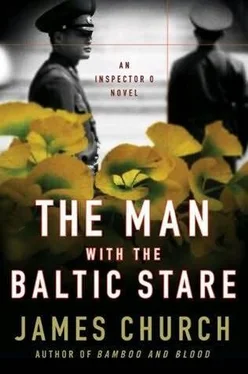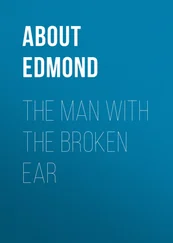“What if the groundskeeper knocks that stone out of place when he steps on it? Or some small boy decides to throw it at his sister?”
“Won’t happen.”
“Inegavelmente!”
“Your Portuguese still sounds like Russian.” He shook his head. “To get to the heart of the matter. If the first two signals are positive, you move out of the right bulwark and go to cannon number nine-that’s in the center of the front wall. Well, off center, actually. It has a number stamped on the top of the barrel-twenty-five-one-nine. On the left side, on the gun carriage itself, the number sixteen-three-eighteen is stamped along the top bar. Next to the ‘eighteen’ will be a leaf, a shiny one.”
This, I thought to myself, is definitely fate.
“Only it won’t really be a leaf, though it’s pretty convincing. Palm it. Then stroll along the wall, looking at the rest of the cannons, with dreams of history in your eyes.”
“Why don’t I simply get the leaf and be done with it?”
“This is Macau, Inspector. If we were in Hong Kong, we’d do it differently, dress up in suits and carry briefcases. Here we work with old cannons. Don’t worry; we’re almost done; let me go over a few background notes. Two people will be setting the first two signs. Neither knows about the other. They’ll set the signals an hour apart, and then only when they receive a go-ahead from someone I have never met. The two that set the signals are completely undetectable, believe me.”
“Old ladies with swords, practically invisible.”
Luís tugged at his collar; the tree had decided to move its shade elsewhere, and we were now sitting squarely in the sun. “The first signal is to indicate whether things are proceeding. The second is to alert you if you’ve been followed into the fort.”
“I can’t figure out by myself if I’m being followed on a deserted street up a hill early in the morning?”
“I’m sure you’re quite good, Inspector, but you have to admit, there might be people who are better. Let’s not take a chance, shall we?”
“And the pseudoleaf? Where does that get us?”
“Ah, sweet mystery of life. It will have a number on it-two digits. If they are both even, you go to the bench directly behind cannon number seven. Not the stone bench, the one with wooden slats.”
“Some operational significance?”
“It’s more comfortable.”
“What if both numbers are odd?”
“Then you go down the hill, slowly so as not to twist an ankle, and come back to this pleasant little square. You’ll get further instructions.”
“And if it’s one even, one odd?”
“Then it’s not our leaf. Jump over the wall if you have to and get out of there in a hurry.”
A two-man team prowled up to the fountain. One of them reached in and fished out a few coins. Luís snorted. “They want to make sure I didn’t throw money in that I’m not supposed to have.” He stood up and gave me a slight bow. “A pleasure talking with you, senhor,” he said in a loud voice. “Please give my regards to each of your adorable wives.” As he went by the fountain, he threw in a fistful of coins.
The hill was gentle at first but became very steep very quickly. The sidewalk was barely wide enough for one person. The street had room for only a single car, and it was one-way going down, so at least no one in an automobile could follow me up. Everything was close and damp with humidity. The air was cool and smelled of rotting leaves; the light was still soft, the morning light that came from the sea. By the time I made it to the top, I was out of breath and sweating. Charming of the Portuguese military to pick a place so hard to reach, I thought, and fumbled with the bottle of water I had bought in the old city so far below. The troops must have cursed every morning they panted up this hill. Any enemy commander storming the place would have decided to break for lunch halfway there.
The fort itself would have been brutally hot, on an open hilltop perilously close to the southern sun, but for the shade of a few trees. From the looks of them, they were a century or more old, and had grown to enormous girth with limbs to match. If Lulu were to come back as a tree, I thought, she would be one of these. Clashing tapes of Chinese music occupied competing squads of old women standing, as Luís had said, on one leg and flipping fans open with the cracks of gunshots. Nineteen cannons sat silent along the front, prepared to blast away at the looming monster of the hotel, if only some Portuguese gunnery officer long in his grave would rise again to give the order.
On cannon number seventeen (counting from the left, including the five in the left bulwark) the feet on the M are filled. One green light. I stop and gaze out the porthole in the wall. I could see history from there, imagine Portuguese ships in the harbor, except it is impossible to see the harbor because of the hotel. I search in my pockets for matches to set off the cannons. On to the blue door of the triangular shed and the steps that lead to it, all in good order. It would take me only an hour or so to touch up that mortar. I’d mention it to Luís if I saw him again.
Each cannon gets a pat on its fat bottom as I pass. I smile at an old man who is leaning against cannon number thirteen, watching his perspiring wife exercise the hell out of a patch of grass. The ninth cannon, as promised, is numbered 25-1-9. It’s unlikely anyone would move these beasts around, but I stand back and do a recount anyway. It’s the ninth from the left, the third cannon from number six, which, as I think Luís said, was the first on the left along the front.
There is no danger of this operation being compromised; nothing this confusing could ever be compromised. Even if the whole thing was leaked, it would take hours to untangle the feet and the steps and the diamonds stamped with crosses. This does not have the feel of anything Kang would plan. He favored simplicity-one cannon and out. The humidity is climbing. I wonder if a person can drown standing on top of a hill on such a humid day. Why did I trust Luís again? He has a complicated existence. There is no reason he should tell me the truth about anything. I palm the leaf-and it is a reasonable imitation of a shiny leaf. The only problem, I see instantly, is that this one has been made to resemble a leaf in May and here we are in October. I walk over to the wall and glance at my hand. The number, ink already bleeding away, is 20.
Twenty? What is that? Is zero even or odd? The day is becoming too hot to worry. I go to the bench in the shade and sit, gazing at the Grand Lisboa. The shape of the building defies description. It is either a gigantic mutant flower feeding on laundered money, or a horrendous arrow from the bow of an angry god who came to earth for some fun and lost a pile playing five-card stud. My concentration is broken by someone who blocks the view. He looks like the man leaning on number thirteen, could even be his twin brother, but with shorter hair. This man has a newspaper under one arm, a small book in his left hand. He sits down and points at the tree next to us. “What do you suppose that is?”
“It’s a ficus,” I say. “An old one, maybe four hundred years. Some Portuguese missionary must have planted it.” Anyone could have planted it. It could have planted itself for all I know. It is very hot, and the Grand Lisboa appears to be dancing.
“There’s a plaque on the tree.”
“Yes, but it’s in Portuguese.”
“Oh, you aren’t from Macau? I could have sworn I’d seen you somewhere. At the Venetian, perhaps, taking in a show?”
I let my eyes roam around the fort. The only person not on one leg is leaning against number thirteen.
Читать дальше












